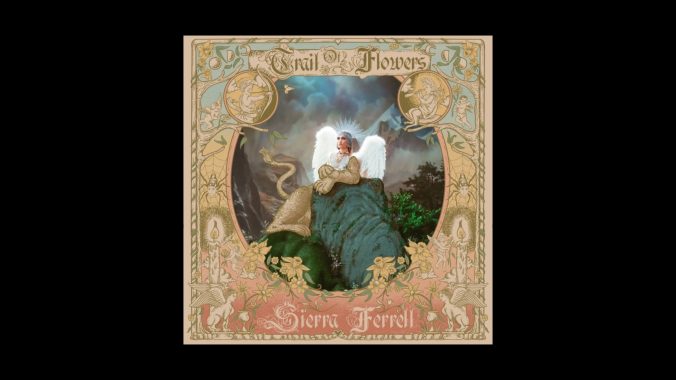Trail of Flowers Finds Sierra Ferrell’s Songwriting More Vibrant Than Ever
The Nashville-via-West Virginia singer-songwriter’s sophomore effort draws inspiration from jazz, bluegrass and mid-century country, arriving detailed, lived-in and nuanced.

On her second album, Trail of Flowers, Sierra Ferrell expands her sights—embracing co-writers, multiple backing vocalists and producers who have worked with country and folk legends like Gillian Welch and Brandi Carlile. The result is Ferrell’s fullest, most expansive album to date, one fit with songs sure to fill the many thousands-strong arenas that the 35-year-old will soon be gracing as an opener on Zach Bryan’s upcoming tour and a worthy successor to her 2021 debut, Long Time Coming. “Dollar Bill Bar,” the second track on Trail of Flowers, is one such moment—playful, delectably catchy and fit with backing vocals from Kristen Rogers and Nikki Lane, which adds to its anthemic charm. Though the song continues to draw inspiration from the bluegrass and mid-20th-century country traditions that Ferrell has long been inspired by, it carries the spirit of a pop song, finding catharsis in straightforward confessions and infectious melodies.
Ferrell generally prioritizes lyricism that is direct and straightforward: The largely acoustic “Lighthouse” revolves around repetitions of “could you be the lighthouse for my soul?,” while her confessions remain as candid as they are pretenseless (“I have been lonely / I have been blue”) on the closing track “No Letter.” Reading Ferrell’s lyrics, I’m often reminded of George Orwell’s six rules of writing, chief among them: Never use a long word where a short one will do, and always cut out any remotely unnecessary words.
There is an obvious charisma to this style of writing, as it imbues Ferrell’s music with a sense of childlike innocence—and when she sings of being hurt and betrayed, she sounds as though she is experiencing such trauma for the very first time. That said, “American Dreaming,” the LP’s opening number, provides a wonderful exception to Ferrell’s usual mode of songwriting. It’s vivid, detailed, lived-in and nuanced, and it makes you wonder whether or not the singer-songwriter would be wise to stray from her tried-and-true formula a tad more often. Indeed, the opening quartet may just be Ferrell’s most affecting yet: “Wake up again in an old motel, is it somewhere different? I can’t tell / Every set of curtains opens to the open road / And I’m missing you like hell, this van is a prison cell / And I know you have gone with her and I can’t go home.”
-

-

-

-

-

-

-

-

-

-

-

-

-

-

-

-

-

-

-

-

-

-

-

-

-

-

-

-

-

-

-

-

-

-

-

-

-

-

-

-








































